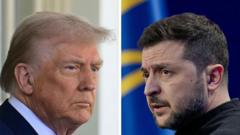In a significant policy shift, the Trump administration has terminated Temporary Protected Status for over 300,000 Venezuelans sheltering in the U.S., sparking fears of deportation amidst ongoing trade wars with allies Canada and China.
Trump Administration Revokes Protections for Venezuelans; Canada and China Plan Retaliatory Tariffs

Trump Administration Revokes Protections for Venezuelans; Canada and China Plan Retaliatory Tariffs
The revocation of Temporary Protected Status for Venezuelans in the U.S. raises concerns about deportations, while trade tensions escalate as Canada and China respond to U.S. tariffs.
The Trump administration has officially ended Temporary Protected Status (T.P.S.) for more than 300,000 Venezuelans residing in the United States, leaving many vulnerable to deportation in the near future. Under this new policy, Venezuelans who obtained T.P.S. in 2023 will lose their temporary protections 60 days following the government’s publication of the termination notice. Advocates for immigrant rights are preparing to mount legal challenges against this decision.
Temporary Protected Status is designed for migrants who cannot safely return to their home countries due to ongoing crises, such as natural disasters or armed conflict. The exodus of Venezuelans has largely resulted from the instability of Nicolás Maduro's government. Critics, particularly within the Republican Party, argue that T.P.S. has extended beyond its initial purpose, evolving from a temporary refuge into a long-term arrangement.
In related news, Canada announced it will implement retaliatory tariffs of 25 percent on over $100 billion in U.S. goods following President Trump’s recent imposition of hefty tariffs affecting Canada as well as China and Mexico. Starting tomorrow, U.S. products including honey, tomatoes, whiskey, peanut butter, and clothing will be subjected to these tariffs. Canadian Prime Minister Justin Trudeau indicated that further actions, potentially involving restrictions on energy exports to the U.S., might also be on the table.
China has also pledged to respond, with its commerce minister threatening “countermeasures” and indicating plans to file a case against the U.S. at the World Trade Organization. Mexican President Lopez Obrador assured a reciprocal response through a combination of tariff and non-tariff measures.
Despite acknowledging the potential economic fallout from his tariff policies, President Trump took to social media to defend these measures, suggesting that they may create some “temporary pain” but ultimately serve the U.S. interests. Economic analysts warn that these tariff disputes may significantly affect the global economic landscape, favoring China while illustrating deepening tensions among major economies.






















